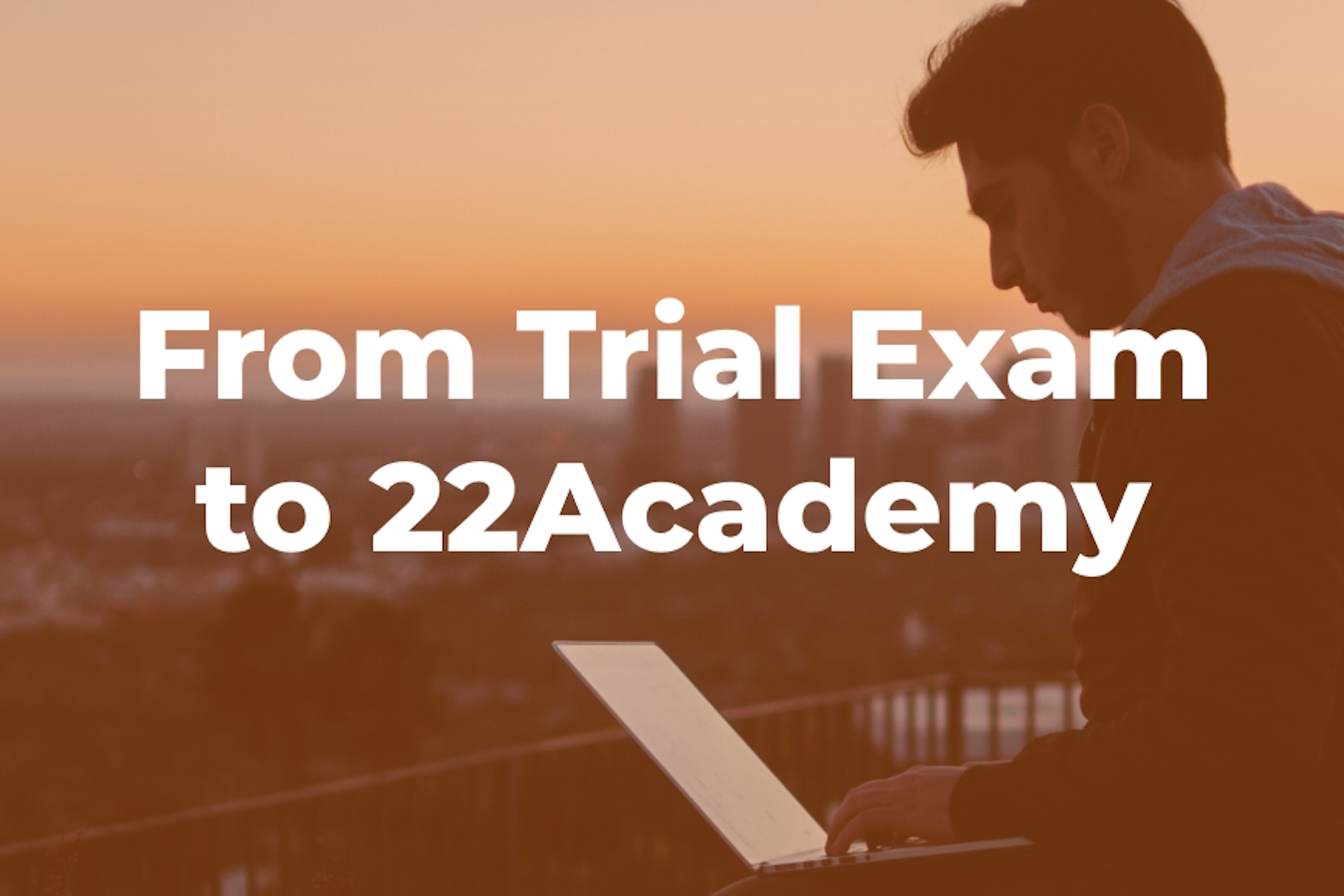From Trial Exam to 22Academy
In 2017, the introduction of the General Data Protection Regulation (GDPR) was about to bring significant changes to privacy and data protection laws in Europe, sparking my interest in this vital area. Recognizing the importance of the Certified Information Privacy Professional/Europe (CIPP/E) certification, I took the step to enroll in an official course. This decision led me to a classroom setting that demanded a hefty sum of €2500 for just two days, which, to my dismay, amounted to little more than group reading sessions from a textbook. This traditional approach to learning fell short of my expectations, and my subsequent failure to pass the exam served as a stark realization: to truly grasp the complexities of GDPR, I needed a more hands-on, practical approach to studying.
This realization prompted me to take matters into my own hands. Since the topic was so new that there were no other trial exams available, I decided to create my own. This wasn't just about passing a test; it was about deepening my understanding and developing a tool that could aid others facing the same hurdles. It was through this process of trial, error, and eventual success that the idea for 22Academy was conceived. My vision was clear: to offer an accessible, self-paced online learning platform that went beyond traditional educational methods, preparing individuals thoroughly for their certification exams without the burden of excessive costs. By removing the financial barriers associated with expensive trainers and physical locations, I aimed to democratize the learning process, making it possible for more people to access quality education in privacy and data protection. This personal venture, driven by my own experiences and challenges, laid the groundwork for what 22Academy is today: a testament to the belief that effective learning should be inclusive, practical, and above all, tailored to the real-world demands of privacy professionals.
Creating an outline
The creation of the trial exam was a meticulous process, rooted in thorough research and a detailed understanding of the CIPP/E body of knowledge and exam blueprint. Utilizing the exam blueprint as a foundation, I crafted an outline that detailed the number of questions required for each domain and subsequently for each subject within those domains. This approach was strategic, aiming to emphasize comprehension of critical topics rather than merely distributing the 90 questions evenly across the three domains—a method I've noticed in some online resources. My goal was to mirror the focus areas of the actual CIPP/E exam, ensuring an accurate learning experience.
In designing the exam, I prioritized the logical grouping of questions related to specific scenarios. Unlike some platforms that employ randomization, I arranged for questions concerning the same scenario to follow one another. Still, all the topics of the questions for each scenario could be randomized.
The Questions
With the dispersion of questions across topics clearly outlined, I faced the challenge of creating scenarios. This task was arguably the most complex, requiring the development of five distinct scenarios that would encompass at least 20 questions in total. Writing these scenarios from scratch demanded creativity and a profound understanding of the subject matter, ensuring that they were relevant, engaging, and reflective of real-world issues in privacy and data protection.
Bloom's Taxonomy played a crucial role in the formulation of questions. This framework categorizes cognitive skills from basic recall of facts to more complex analytical and evaluative thinking. By applying Bloom's Taxonomy, in combination with formulating the questions according to some eight different formats, I was able to ensure that the questions not only tested factual knowledge but also challenged learners to apply, analyze, and evaluate information, requiring a deeper understanding of the subjects at hand.
The quality of the questions was paramount. It was essential that the difficulty of each question stemmed from the complexity of the subjects rather than from deceptive or trick questions. Each question was designed to provoke thought and require an understanding that went beyond mere facts, emphasizing the rationale behind correct answers. Furthermore, explaining each question—and the reasoning behind the correct answers—was not only beneficial for potential users of the trial exam but also reinforced my own understanding of the material.
User Interface
Having personally experienced failing the certification exam, I knew exactly what features the trial exam's user interface needed to replicate the real CIPP/E exam environment. I developed a user interface that closely mimicked the actual exam, complete with a countdown clock, options to bookmark questions, make notes, and an overview screen to ensure no question was overlooked. This immersive experience was designed to familiarize users with the exam format, reducing anxiety and improving performance.
This deliberate integration of specific elements—the strategic organization of the exam content, the formulation of high-quality questions guided by Bloom's Taxonomy, and a user interface that mirrors the certification exam—was driven by my aim to provide a thorough and realistic preparation tool. This approach addresses the practical needs of learners while instilling the deep understanding required to navigate the complexities of privacy and data protection.
Comparing Trial Exams
Initially, my trial exam emerged as the premier (and only) option for testing one's CIPP/E knowledge in a setting that closely resembles the official exam environment, offering an authentic experience before the actual test. While my exam is now among several available mock tests for CIPP/E, my observations lead me to believe it remains unparalleled. The distinction primarily rests on the aspects previously highlighted: the thoughtful dispersion of questions throughout the exam, the quality of those questions, and the scoring approach across three domains, and of course the close resemblance to the official environment. Moreover, the inclusion of various scenarios and question formats, coupled with the imperative of regularly updating the questions to keep pace with the evolving field of privacy and data protection, sets my exam apart. The most significant challenge with mock exams found in books is their immediate obsolescence post-publication. Although they may feature well-crafted questions, the comprehensive qualities I've integrated into my trial exam underscore its superior value.
Personal Analysis
Upon completing the trial exam, users are provided with a personalized results analysis. This report elucidates each incorrectly answered question, guiding users to revisit specific topics or areas in their course materials or textbooks that may need further review. This feedback mechanism is designed without revealing the exact wording of questions and answers from the exam, a decision that has sometimes met with some resistance. Critics argued that having the precise phrasing of questions is crucial for understanding mistakes. However, the uniqueness of each question and the likelihood that they will not appear on the actual exam underscore the importance of grasping the underlying concepts and subjects rather than memorizing specific questions.
To support those keen on question-based learning, I have since developed an additional eight tests, encompassing 400 new questions for both CIPP/E and CIPM. These tests are available online, and users also receive a PDF with an answer key and explanations, ideal for study sessions. Yet, for the most effective final review before the certification exam, the original trial exam offers the best simulation.
Initially, creating these analysis documents was a manual process that took nearly two hours per individual, necessitating an additional fee. However, recognizing the value and efficiency of this feature, I have now automated the analysis document, including it with every trial exam at no extra charge. While some opt for the trial exam merely to familiarize themselves with the exam's flow—wherein the analysis may not be deemed necessary—it now serves as an integral component of the trial exam package, enhancing the overall preparation experience.
Future developments
Ending on a note that's a bit lighter, it's kind of ironic when I think about it. If I hadn't failed that certification exam after spending so much on what turned out to be a pretty expensive way to read a textbook in a room full of people, 22Academy might never have existed. It's evident that what started with a singular focus on the CIPP/E exam has evolved into something much broader and deeply impactful. 22Academy has grown to encompass a range of courses and exams, each designed with the same commitment to quality, accessibility, and real-world applicability that marked my initial venture.
Beyond just offering budget-friendly resources for privacy and data protection, I'm continuously working on expanding our offerings, including the development of a comprehensive training course, trial exams, and practice tests for the new AIGP (Artificial Intelligence Governance Professional) curriculum. This expansion reflects not just a response to the evolving landscape of privacy and technology but also my commitment to providing learners with the tools they need to succeed in these critical areas. As 22Academy continues to grow, my aim remains the same: to offer the most effective preparation tools out there, grounded in practical experience and designed to meet the real needs of professionals in the field.
Here's to the future of learning and succeeding together in the ever-changing realms of privacy, data protection, and AI governance!



